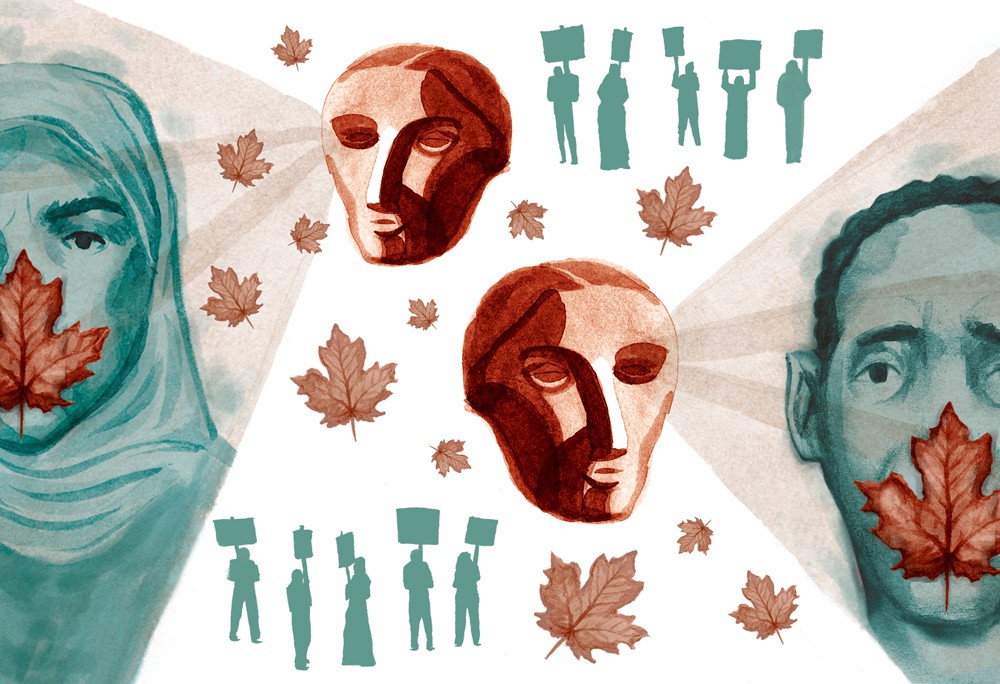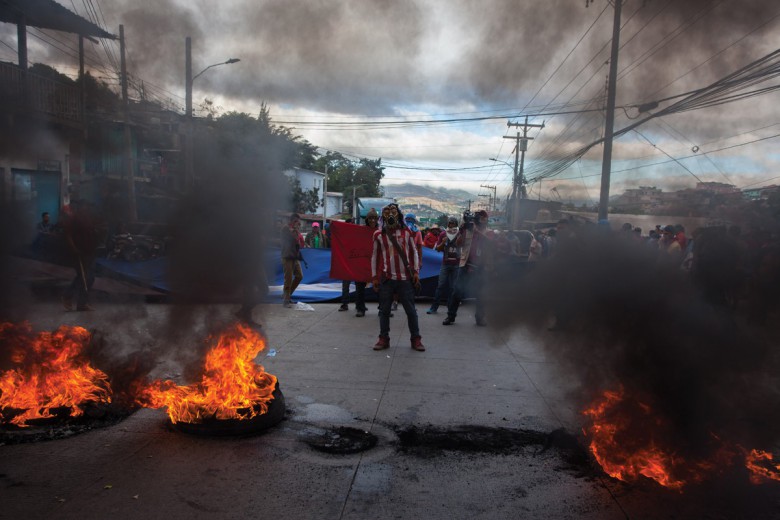
It was an otherwise ordinary afternoon in mid-June 2014. Dozens of people packed a yellow bus in Edmonton to answer a call-out issued by community organizers opposed to the federal government’s drastic changes to Canada’s Temporary Foreign Worker Program. The destination of the bus was the constituency office of Jason Kenney, former minister of citizenship, immigration, and multiculturalism, in southeast Calgary.
The bus’s arrival was greeted by dozens of Calgarians from all walks of life, who promptly facilitated a noisy but respectful demonstration and press conference on the sidewalk. Outside of a few puzzled looks from passersby and a harried conversation with a staffer who was presented with a petition opposed to the government’s plans, the event came and went without incident.For their part, police were on hand and were (relatively) well-behaved. Outside of issuing a stern warning to organizers reminding them not to illegally block access to the street or office, they were content to let the rally run its course. It was the kind of event that represents a key right many Canadian citizens value highly today – the right to peaceful assembly and protest.
Unfortunately, the passage of two bills by the federal government within the past 15 months have dramatically changed the legal terrain for people who engage in this form of political expression – and the consequences could be devastating.
Bill C-24: creating two-tiered citizenship
Curiously named the Strengthening Canadian Citizenship Act, Bill C-24 was passed by Parliament in June of 2014 and is now officially law. Bill C-24 is a game-changing piece of legislation in that for the first time, it allows for people living in Canada who are dual citizens to be stripped of their Canadian citizenship and deported.
In addition, proceedings to strip a person of Canadian citizenship are now overseen by a high-ranking official acting under the directives of the minister of citizenship and immigration (replacing the right to an oral hearing in front of a Federal Court judge), and applicants no longer have the right to appeal a denial of their application with the courts.
According to an infographic published by the federal government, revocation of Canadian citizenship could occur if the following conditions are met:
• if a dual citizen were to be convicted of treason or espionage (as per the Criminal Code of Canada);
• if a dual citizen were to be tried and convicted of a terrorism-related offence (in Canada or abroad) and sentenced to five years in prison or longer (as per the Criminal Code);
• if a dual citizen served as a member of an armed force or organized group engaged in an armed conflict with Canada.
Several new measures also make Canadian citizenship more difficult to obtain. These include:
• increasing the amount of time from three years to four that a permanent resident must live in Canada before applying for citizenship;
• prohibiting students, workers, and refugee claimants from claiming time spent in Canada prior to obtaining permanent residency in their applications for citizenship;
• tripling the fee for applying for Canadian citizenship;
• broadening the age limits for who must prove their proficiency in English or French. Previously, this was a requirement of individuals aged 18-55. Now it applies to all applicants aged 14-64;
• a doubling of the wait times required before a permanent resident can apply for citizenship (from 4-6 to 8-10 years).
What this means in practice is that with the stroke of a pen, Canada has created what the Canadian Association of Refugee Lawyers has called ”two classes of citizens.” The first class is permanent and restricted to people who have acquired Canadian citizenship by birth and do not have citizenship elsewhere.
By contrast, the second class is precarious and reserved for dual citizens, naturalized Canadians, and even the children of naturalized Canadians if the minister of citizenship and immigration has reasonable grounds to believe that they are citizens of another country.
Furthermore, changes brought in with C-24 have the effect of punishing dual citizens twice for the same crime. “Whereas ‘top tier’ citizens in Canada only have to worry about being processed by the criminal justice system for crimes they stand accused of, dual citizens must now also be concerned that charges brought against them could trigger wide sections of immigration law as well,” says Aditya Rao, a University of Ottawa law student. “There is a big concern that these new regulations will disproportionately target racialized people in Canada, many of whom are already marginalized members of our communities.”
Bill C-51: the racist dragnet widens
Passed roughly one year later, Bill C-51 (officially named the Anti-terrorism Act) has become a key focal point of the Conservative government’s ideological agenda. Under the pretext of protecting people living in Canada from the existential threats posed by “jihadist” extremists, the bill provides sweeping new powers to security and law enforcement agencies, including:
• the creation of a new offence (the “promotion of terrorism”) within the Criminal Code of Canada. This new provision can criminalize any opinion deemed by the government to be “reckless” or that “may” cause a person who hears it to act out in a terroristic way (even if that was not the original intention of the viewpoint);
• the removal of online content deemed by a Federal Court judge to be “terrorist propaganda,” and the right for federal customs agents to confiscate any physical or electronic materials deemed to be in “promotion” of terrorist ideals;
• the criminalizing of any offences that interfere with critical infrastructure and the economic stability of the Canadian state. This would include organizing or participating in unauthorized strikes, rallies, pickets, or blockades;
• the disclosure of any and all information the government has on people living in Canada to any government/security agency that asks for it for any purpose;
• the creation of a new “secret police” in Canada by granting the Canadian Security Intelligence Service (CSIS) the power to identify and take measures to eliminate anything it has identified as being a threat to the Canadian state. This can include the “preventative detention” of individuals without charge for up to seven days, and other acts considered illegal or in violation of the Charter of Rights and Freedoms.
The Harper government introduced Bill C-51 in response to attacks by two separate individuals on Canadian soldiers in Quebec and on Parliament Hill within days of each other last October. Despite ample evidence suggesting the perpetrators of these acts had serious mental health concerns, police, politicians, and media pundits alike were quick to label the attacks as terrorism that was influenced by radical Islam (despite the fact that no evidence has been uncovered to link these acts to a terrorist “sleeper cell”).
This stands in stark contrast to the way in which a foiled plot to kill multiple people on Valentine’s Day in Halifax was portrayed. Despite the obvious connections the two young conspirators had to neo-Nazism, official media reports downplayed the link. Federal Justice Minister Peter MacKay went so far as to declare that the attack by the two “murderous misfits” was not “culturally motivated.”
MacKay’s response offered a glimpse into how the Canadian government views “terrorism” through a racialized lens. “Elena” (who has requested anonymity) is a community organizer in Edmonton and argues that discussions surrounding the introduction of Bill C-51 used highly charged language and painted a narrow image of what a potential terrorist looked like. “They’re using the fight against ISIS in the Middle East to justify an Islamophobic, anti-migrant agenda back home,” she says. “There is a real danger that what the government is now doing will create more problems in our communities; people will simply feel scared and mistrustful of all people who come from regions deemed to be hot spots of terrorism.”
Upping the ante in the war on dissent
Syed Hussan, a Toronto-based migrant justice activist, concurs. In his view, the passage of bills C-24 and C-51 merely extends the ongoing threat of deportation to a new group of people: Canadian citizens. “When migrants are charged, it is almost always under immigration, rather than criminal law. Immigration law has far less oversight and can act more harshly than the criminal justice system – with security certificates being the most egregious example in practice today,” he says. “What C-51 and C-24 do is further entrench the colouring of terrorism by the state, and make it much easier to severely punish outspoken migrants who have already obtained permanent status in Canada.”
There has been spirited countrywide organizing in opposition to Bill C-51 (with even Conservative groups coming out publicly in opposition to it), and much ink has been spilled discussing the negative impact of this sweeping new legislation on Indigenous peoples, environmentalists, and community activists. However, there has been far less discussion about how bills C-24 and C-51 together expose untold numbers of people (many of whom have lived their entire lives here) to harsh state repression simply for standing their ground and publicly disagreeing with the direction in which Canada’s political and economic elites want to take the country.
“James,” a worker at a state-funded settlement agency in Alberta who prefers to speak anonymously, says, “These new policies only make sense if we examine them as part of an agenda that seeks to crush domestic political dissent.” As a dual citizen myself, it is perhaps this last point that really drives home the extent to which new parameters on acceptable political discourse are being imposed in Canada. This is something that should give each and every one of us great cause for concern.






